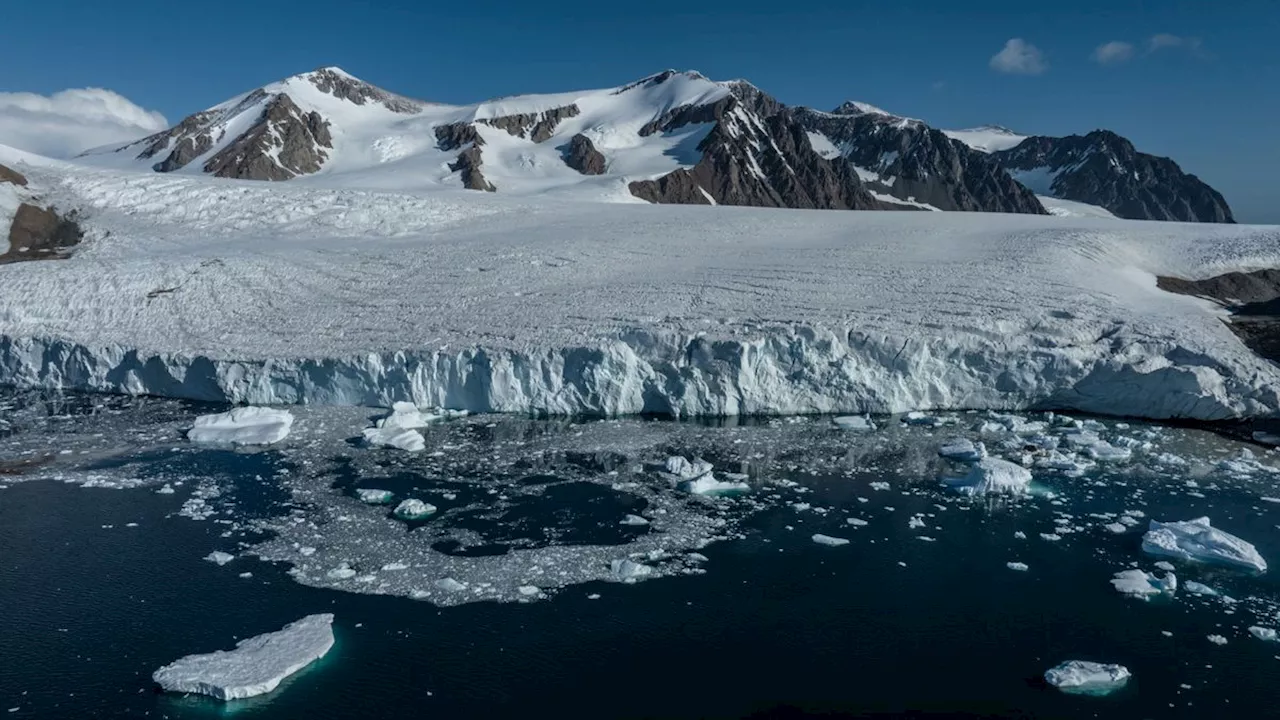Postdoctoral Fellow in Physical Oceanography, University of Tasmania.
ice sheet can be hard to comprehend. Two kilometres thick on average and covering nearly twice the area of Australia, the ice sheet holds enough freshwater to raise global sea levels by 58 metres.from this sheet is projected to be the leading driver of sea level rise by 2100, yet its contribution remains highly uncertain.
The boundary layer between the ice shelf and the ocean is cold, miles from anywhere, and beneath very thick ice, so it’s no wonder it has hardly been measured at all. But only recently have simulations of the ice-ocean boundary layer become feasible, as computing resources grow and the cost of using them shrinks.
For steeply sloping ice, the insulating effect is much less. The energetic flow of meltwater as it rises under steep ice leads to mixing with the warmer ocean waters. This increases melting.Using sonar and cameras, these robots have revealed a weird and wonderful"icescape" on the underside of ice shelves.
For instance, in the warm, calm eastern part of the Dotson ice shelf in west Antarctica, an autonomous robot observed basal terraces. In the west of Dotson — which experiences cold, fast currents — large mussel-shaped scoops were discovered.that allow the ice-water boundary to move in time show the"self-sculpting" behaviour of ice melt. This is similar to how dunes form and move in a desert.
United States Latest News, United States Headlines
Similar News:You can also read news stories similar to this one that we have collected from other news sources.
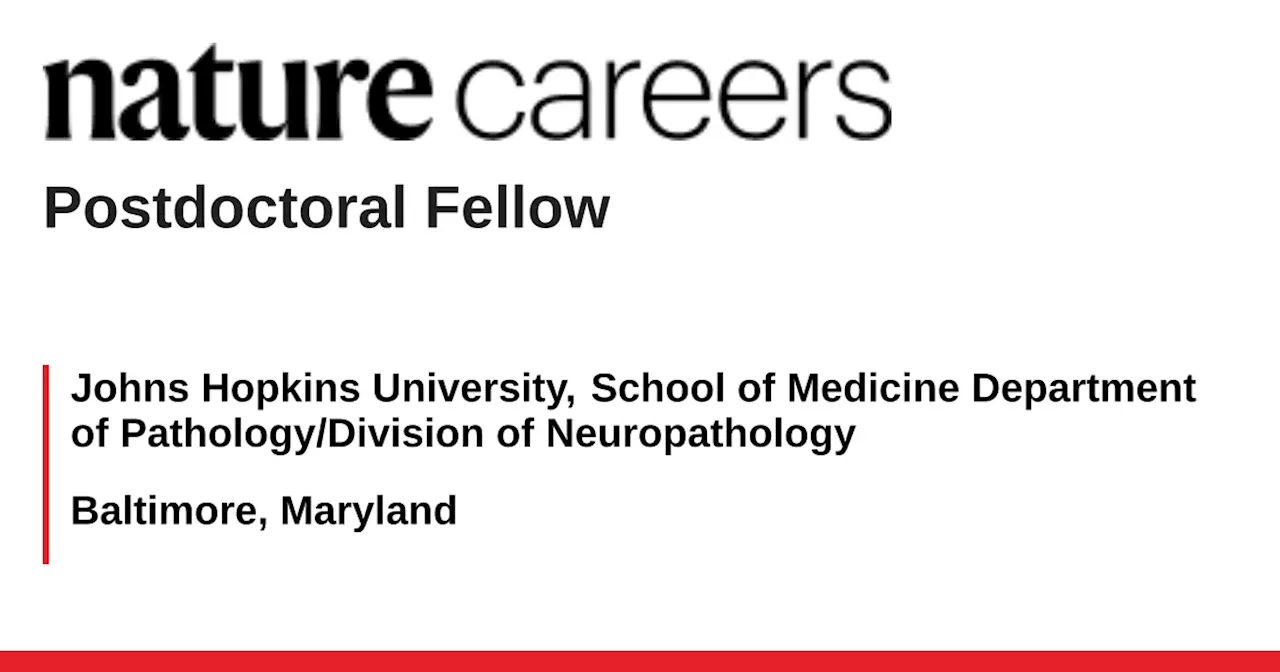 Postdoctoral Fellow Positions in Molecular Mechanisms of Neural Injury and RepairThe Koliatsos Lab at Johns Hopkins University is seeking postdoctoral fellows to investigate molecular mechanisms of neural injury and repair. Research focuses on axon protection and CNS pathway restoration using neuronal precursor grafts, genetic editing, and small-molecule strategies. Candidates with a doctoral degree and expertise in cellular/molecular neuroscience, animal models of disease, or experimental neuropathology are encouraged to apply. Experience with human stem cell manipulation, neuronal differentiation, or transplantation is essential.
Postdoctoral Fellow Positions in Molecular Mechanisms of Neural Injury and RepairThe Koliatsos Lab at Johns Hopkins University is seeking postdoctoral fellows to investigate molecular mechanisms of neural injury and repair. Research focuses on axon protection and CNS pathway restoration using neuronal precursor grafts, genetic editing, and small-molecule strategies. Candidates with a doctoral degree and expertise in cellular/molecular neuroscience, animal models of disease, or experimental neuropathology are encouraged to apply. Experience with human stem cell manipulation, neuronal differentiation, or transplantation is essential.
Read more »
 Postdoctoral Fellow Position in Computational TranscriptomicsThe Computational Transcriptomics lab at the Genome Institute of Singapore is seeking a highly motivated postdoctoral fellow to develop novel methods for analyzing long read transcriptomics data, particularly focusing on RNA modifications from nanopore direct RNA-Seq data.
Postdoctoral Fellow Position in Computational TranscriptomicsThe Computational Transcriptomics lab at the Genome Institute of Singapore is seeking a highly motivated postdoctoral fellow to develop novel methods for analyzing long read transcriptomics data, particularly focusing on RNA modifications from nanopore direct RNA-Seq data.
Read more »
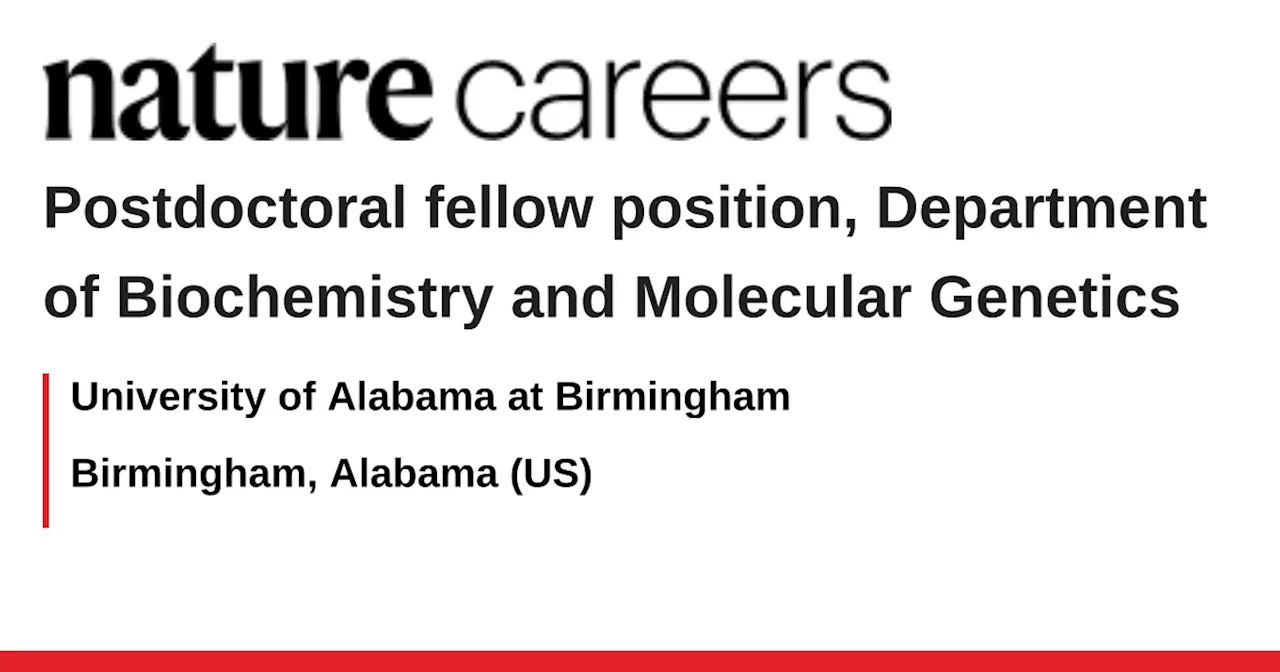 Postdoctoral Fellow Position in Cancer GeneticsDr. Narendra Wajapeyee's lab at UAB is seeking a highly motivated Postdoctoral fellow with expertise in Genomics, Proteomics, and Cancer genetics. Candidates should have a strong PhD background with publications and experience in cancer research using mouse models, immune-oncology approaches, and functional genomics techniques. Basic molecular biology skills are required. The lab welcomes recent PhD graduates starting their postdoctoral training.
Postdoctoral Fellow Position in Cancer GeneticsDr. Narendra Wajapeyee's lab at UAB is seeking a highly motivated Postdoctoral fellow with expertise in Genomics, Proteomics, and Cancer genetics. Candidates should have a strong PhD background with publications and experience in cancer research using mouse models, immune-oncology approaches, and functional genomics techniques. Basic molecular biology skills are required. The lab welcomes recent PhD graduates starting their postdoctoral training.
Read more »
 Postdoctoral Fellow Position in Neurogenetics at UTHealth HoustonThe Center for Neurogenetics at UTHealth Houston is seeking a motivated Postdoctoral Fellow to join a team focused on advancing neurogenetics research. This role involves analyzing genomic, molecular, and clinical data, developing computational tools, and collaborating with interdisciplinary teams to uncover insights into neurological disorders.
Postdoctoral Fellow Position in Neurogenetics at UTHealth HoustonThe Center for Neurogenetics at UTHealth Houston is seeking a motivated Postdoctoral Fellow to join a team focused on advancing neurogenetics research. This role involves analyzing genomic, molecular, and clinical data, developing computational tools, and collaborating with interdisciplinary teams to uncover insights into neurological disorders.
Read more »
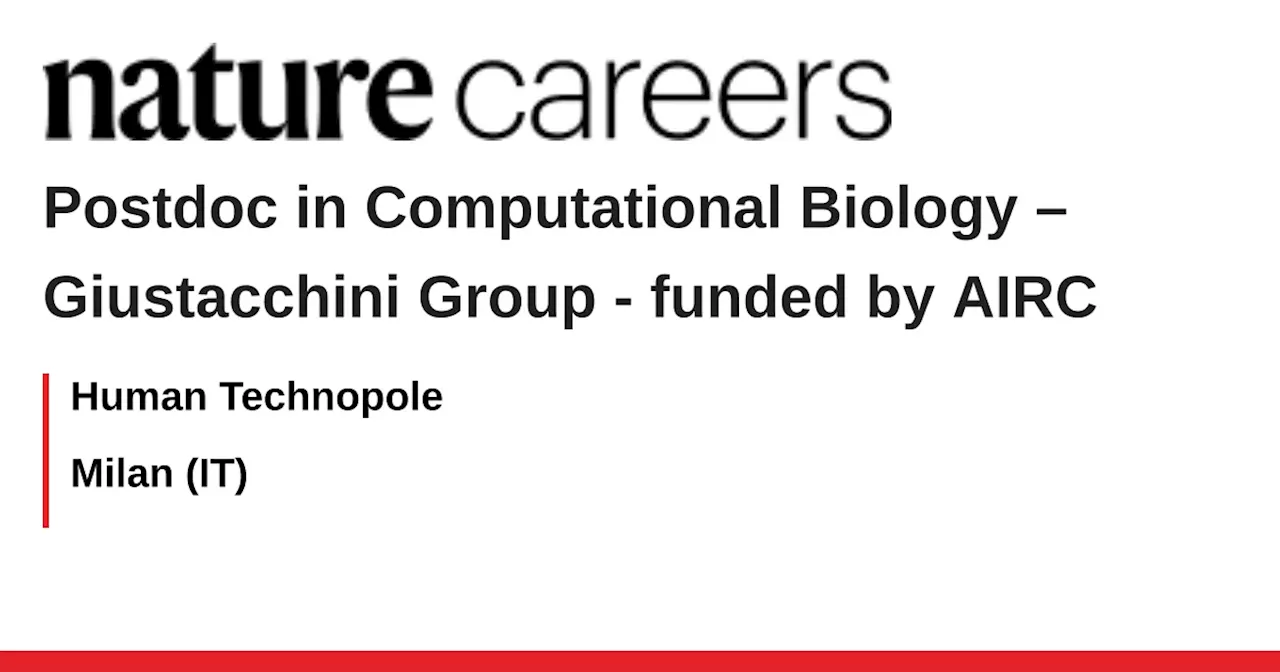 Human Technopole Seeks Postdoctoral Researcher in Computational Biology for CAR T-cell Therapy ResearchHuman Technopole (HT) is recruiting a postdoctoral researcher to investigate the cellular and molecular dynamics of CAR T-cell therapy in blood cancers. The project, funded by AIRC foundation for cancer research, will utilize state-of-the-art single cell multiomics data and computational approaches to model in vivo interactions between CAR T cells, tumor cells, and normal hematopoiesis. The goal is to uncover mechanisms driving therapeutic resistance, tumor reshaping, and hematopoietic impact under CAR T-cell pressure, ultimately aiming to improve immunotherapy strategies for hematologic malignancies.
Human Technopole Seeks Postdoctoral Researcher in Computational Biology for CAR T-cell Therapy ResearchHuman Technopole (HT) is recruiting a postdoctoral researcher to investigate the cellular and molecular dynamics of CAR T-cell therapy in blood cancers. The project, funded by AIRC foundation for cancer research, will utilize state-of-the-art single cell multiomics data and computational approaches to model in vivo interactions between CAR T cells, tumor cells, and normal hematopoiesis. The goal is to uncover mechanisms driving therapeutic resistance, tumor reshaping, and hematopoietic impact under CAR T-cell pressure, ultimately aiming to improve immunotherapy strategies for hematologic malignancies.
Read more »
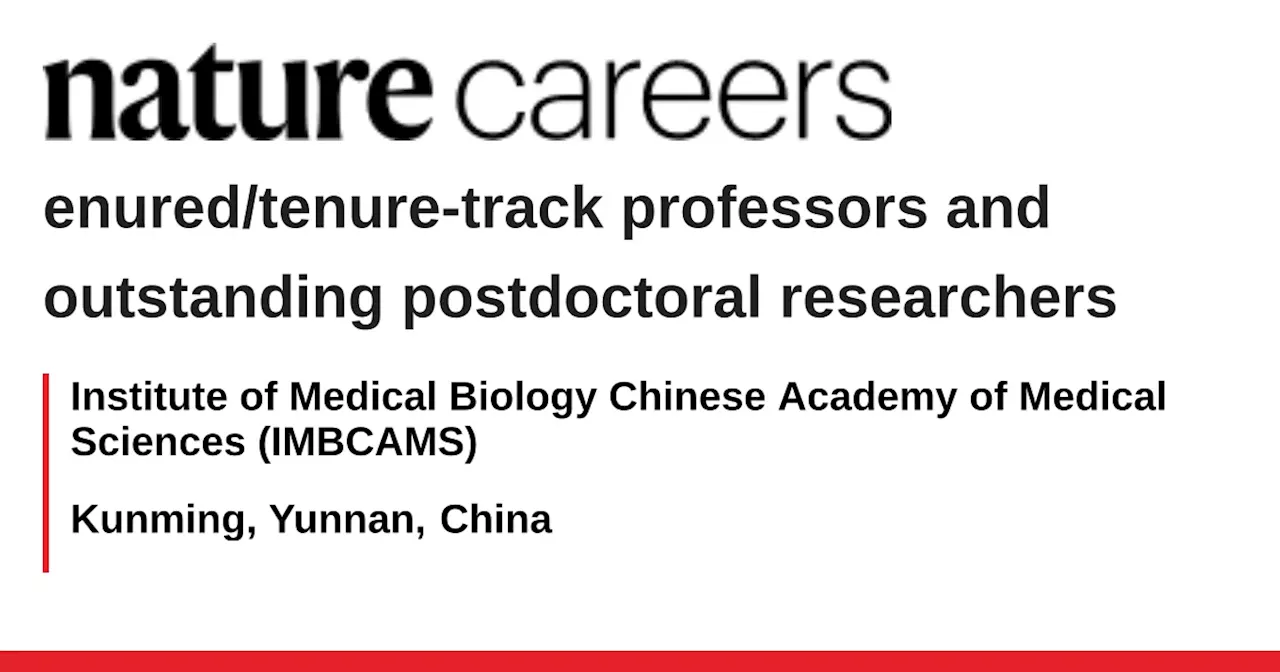 IMBCAMS Launches Global Recruitment Program for Professors and Postdoctoral ResearchersThe Institute of Medical Biology Chinese Academy of Medical Sciences (IMBCAMS) is seeking tenured/tenure-track professors and outstanding postdoctoral researchers to join its team. IMBCAMS, founded in 1958, is a national scientific research institute focused on medical research, development of biological products, and postgraduate education. The institute actively undertakes major scientific research tasks and is dedicated to the research and development of innovative vaccines. Successful applicants will have the opportunity to contribute to cutting-edge research, build independent research teams, and enjoy various benefits and support programs.
IMBCAMS Launches Global Recruitment Program for Professors and Postdoctoral ResearchersThe Institute of Medical Biology Chinese Academy of Medical Sciences (IMBCAMS) is seeking tenured/tenure-track professors and outstanding postdoctoral researchers to join its team. IMBCAMS, founded in 1958, is a national scientific research institute focused on medical research, development of biological products, and postgraduate education. The institute actively undertakes major scientific research tasks and is dedicated to the research and development of innovative vaccines. Successful applicants will have the opportunity to contribute to cutting-edge research, build independent research teams, and enjoy various benefits and support programs.
Read more »
